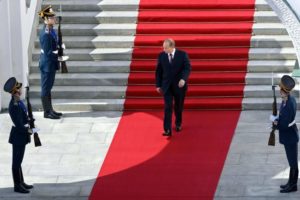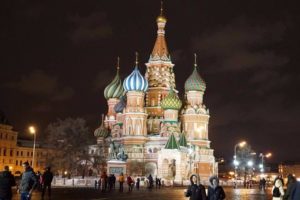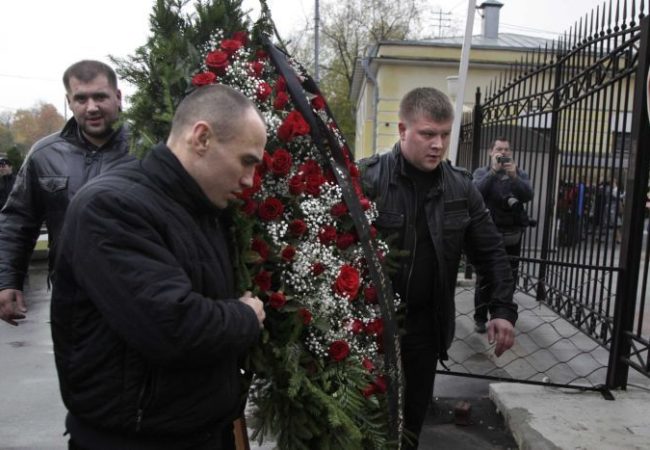While there are still plenty who fit the stereotype, the reality for many of the vory — the Russian «super mafia» — is a very different, and far more modern, presentation.
According to Mark Galeotti, who has charted the rise of the vory in a new book, the members of one of the most powerful organised crime groups in the world are more likely to look just like an ordinary citizen.
«The really serious vory wear suits and have a portfolio of interests from legitimate to totally criminal,» Galeotti said.
«They can be very difficult to distinguish from ordinary Russian society.»
Part of what makes the vory distinct from other organised crime groups — like the mafia in Italy or the Yakuza in Japan — is their growing influence around the world.
According to Galeotti, their rise to prominence is a story of innovation in the way contemporary organised crime operates.
«If one had to come up with some kind of league table of global mafias, the Italians are still the most powerful and the richest,» he said.
«But the Russians are the most international.
«We see them on every single continent except Antarctica — but even there I just say ‘give them time’.»
World Cup of crime
While the Kremlin has denied links to organised crime, Galeotti said the vory draws much of its influence from its interaction with the Russian state and President Vladimir Putin.
He said Mr Putin had largely abandoned the tough law and order rhetoric he espoused when he came to power in 1999.
Instead, Galeotti said, Mr Putin has offered the underworld a kind of «social contract» that defines the terms under which Russian gangs operate.

PHOTO: Since his return to power, Vladimir Putin has signalled political opposition will not be tolerated.
«The state doesn’t control organised crime, but it clearly makes its views known,» he said.
«[It says] ‘you carry on your crimes and the police will carry on trying to catch you, fair enough. But if you do anything that looks like a challenge to the [Russian] state, then we will treat you as enemies of the state’, which is obviously a much more serious thing under an authoritarian like Putin.
«This is not a mafia state… it’s one in which the gangsters have come to realise that the state is the biggest game in town, therefore they need to stay within the lines that Putin sets.»
This dynamic operates not only with the stick, but also the carrot, according to Galeotti.
He highlighted the lead-up to the World Cup, which has been a cash bonanza for the vory and other gangs willing to operate within the system.
By doing so, they gain access to lucrative construction and land deals for hotels and stadiums.
The downside to this, Galeotti said, is the heightened risk of Russian state intervention against organised crime during the World Cup — which he called a «Putin vanity event» and attempt to accrue soft power for Russia in the same way as the Sochi Winter Olympics.
«One of the big concerns, along with other challenges like violent hooligans and terrorism and so forth, is that gangsterism will be unleashed against all these foreign visitors who don’t really know the ropes,» he said.
«So it’s clear that the message has been going out within organised crime, saying: ‘lay off’.
«The state wants things to go well, and it is willing to make it clear that it will visit its vengeance on those who mess with it.»
Mobsters to the world
As detailed by Galeotti, the vory have a lasting presence in the history of Russian crime and a long arm when it comes to the global underworld.
Their modern position was cemented with the return of the ‘Afgantsy’: veterans of the Soviet war in Afghanistan in the 1980s. This period brought exceedingly capable specialists like snipers, bomb makers and special forces officers into the orbit of organised crime.
The vory can now offer drugs, computer hacking, contract killing, human trafficking or money laundering to other gangs around the world.

Instead of trying to take over territory or criminal markets as they did, unsuccessfully, in the 1990s, Galeotti said the Russian gangs had refined their international approach in recent years.
«They way they work is basically as dealmakers,» he said.
«They turn to all the local gangs — and it doesn’t matter if we’re talking about Australia, Canada, or South Africa — and they’ll say ‘what do you need? Whatever you need, we’ve got it’.
«So this is, in some ways, how the Russians have internationalised.
«You may not see their gangsters on the streets, but on the other hand, the gangsters you do — the locals, generally — are in some ways being facilitated by the Russians as these criminal service and goods providers.
«And that’s a totally new model, one that doesn’t try and say ‘you’ve got to become part of our gang or obey our rules’ or whatever, it just simply says ‘we can do these things for you, you want to make a deal, we’re here’.»
The father of the Russian mafia
Despite their modern appearance, it was Stalin’s gulags — the system of forced labour camps where millions of people were imprisoned in the 1940s and ’50s — that really accelerated the growing power of the vory, Galeotti said.
He said it was one of the «tragic ironies» in the story of Russian organised crime that Stalin swept many more innocent Soviet citizens into the gulags rather than gangsters.
«This was a period in which you could be sent to prison for years for telling the wrong joke or not laughing at the right joke,» he said.
«So in order to manage this massive population in the labour camps, Stalin effectively co-opted people from within the underworld.»
In effect, Galeotti said, Stalin used these detained criminals to police the political prisoners, and to be the guards and the foremen that made the gulag system work.
The move helped make the vory into what they are today, and the group becoming stronger than ever once the gulag system was torn down, Galeotti said.
«When the gulags were opened up, it was this new generation of vory who went out and essentially colonised the rest of the Soviet underworld,» he said.
«So in many ways Stalin was the father of the Russian mafia.»

